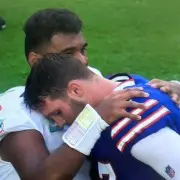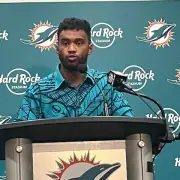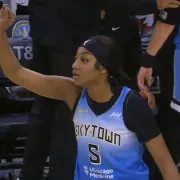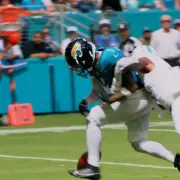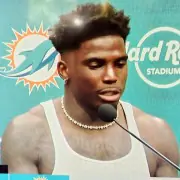Mateo’s Hoop Diary: The Big Galactus returns to Miami on The OGs podcast
Former legendary center and Heat standout Shaquille O’Neal came to The OGs’ studio, imparting his wisdom and nonsense. He unfairly ranted about Rudy Gobert, discussed Heat stories, family importance and more.
At his peak, O’Neal was the most dominant force in basketball history, second to Wilt Chamberlain. He had moves at close range and unreal athleticism. And it was a wrap if he played with rage.
The direction of his stepfather, sergeant Philip Harrison, who he acknowledges as his real father, and mother, are who he credits for setting him straight. As a teen, Shaq said he was a “high-level juvenile delinquent.” He didn’t mention it on the show, but he was also part of a break-dancing team, the Furious Five, and competed on sight with other groups. His name back then was Shocka D, and his ability to fight and move his hips granted him admission into the group.
He stopped hanging out with them after his friends stole a car in Germany on the army base. As the theft began, O’Neal backed away, wanting no part. He left them behind forever.
O’Neal has been contumelious because he could, wasted an offseason before getting surgery to avoid camp, and lied about David Robinson in his 2001 memoir. But make no mistake, he is one of the cool, good guys who passed through the NBA.
He’s also generous and hilarious. Never forget when he had a prosperous night at the line and nicknamed himself The Big Havlicek. He modified his Rolls-Royce by removing the steering wheel and inserting one in chrome modeled after Superman, too.
When Dennis Scott’s father died, Shaq was the teammate there for him. He removed the mattress from his hotel room, brought it to Scott’s and became his roommate.
He did Shaq’s-giving his first two years in Miami, and during Christmas, while he was Shaq-a-Claus, he gifted his teammates lots of his sponsored gear. For example, he left shoes in lockers and once gave his peers nice watches.
Let’s review the important topics of this episode.
Penny Hardaway and Kobe Bryant
Shaq said Penny had everything and didn’t have to “tell him anything.” Notably, he left out the part where it pissed him off that Hardaway didn’t stick up for him to management during negotiations as Shaq did with everybody.
If you read Jeff Pearlman’s book Three Ring Circus: Kobe, Shaq, Phil and the Crazy Years of the Lakers Dynasty, or coach Phil Jackson’s The Last Season: A Team in Search of its Soul, you’ll understand that it bothered Shaq that Kobe didn’t view him as a big brother.
Also, it wasn’t just that Bryant shot too much. While Kurt Rambis was coaching the Lakers, he reminded O’Neal of a coddled relative who had it easier than him growing up. The big man hated the special treatment Bryant got and once wrote Rambis “was always making excuses for Kobe.”
There was respect between the two for their abilities, but they were not friends. O’Neal despised Bryant’s selfish playstyle. Bryant loathed O’Neal’s helplessness to stay in shape.
Departing Orlando
He said he left Orlando over money. It was a small factor, but the relationship was finished when the organization didn’t let him properly grieve his grandmother Odessa Chamblis’ death.
On a smaller scale, Shaq hated how general manager John Gabriel carried himself as if he did most of the work to get to the ‘95 Finals.
Gobert
This time, he unfairly said that because Gobert’s making so much money, his accomplishments aren’t enough. O’Neal knows as well as anyone how much big men rely on their teammates to guard the point of attack. In Utah, Gobert didn’t get much help there. The second line of defense, Gobert’s territory, can only recover so much when the first space is cooked.
The biggest concern with Gobert’s game is offense. He scores off putbacks and rim rolls against light pressure. He is not a big who creates for himself, which allows his defender to play as a free safety.
Big men shooting
O’Neal said, “If I’m the biggest guy out there, I’m not shooting fucking jumpers.“ he also questioned why Joel Embiid takes long shots. In this case, they were only 16.5% of the Philadelphia center’s shot diet. O’Neal recently criticized Victor Wembanyama for the same stuff.
He sounds like an old man screaming to get off his lawn to most people. Yet, O’Neil is right on this topic.
Elite size and skills are the great equalizers in basketball. As pretty as it looks for Embiid and Wemby to rise from the perimeter for jumpers, they are bailing out the defense by taking harder shots and not trying to put the opponent in foul trouble. Consider this: Embiid has been first and second the last two seasons in free throw attempts average (11.6), but it could be higher. Embiid averages 9.7 free throws per game in the Playoffs. His speed, strength and close-range arsenal could generate three-to-four more trips.
Wemby’s outside shooting is more problematic. He takes a high volume of outside shots, and he is not good at making them. Even if he does improve, the perimeter is not the area where he will be double-teamed. As long as he stays out there, he is not pressuring the defense as much as he can by going inside.
Time with the Heat
O’Neal said Heat president Pat Riley challenged him, expecting another ring when he got to Miami. The candid convo inspired him to lose about 40 pounds, and he was second in MVP voting in his first year with the club.
Riley also said that he could give Shaq the money he wanted, but the team would have no one , or he could take less and he would be able to bring back the other pieces. Shaq said, “I gotta win one before ol’ boy gets one,” referring to Bryant.
After winning in 2006, Riley still sent letters to his players about his expectations for the upcoming seasons.
Other notable revelations:
Udonis Haslem was Shaq’s body fat inspector general. Still, the Big Cactus was apparently using baby oil to look ripped and dupe the evaluation.
When asked about his thoughts on the current club, he said the Heat need another big-time scorer.
O’Neal claims to be the first to get Riley to change his ways by temporarily pushing back the practice start time. The story goes Riley threatened a $1,000 fine for violating curfew. O’Neil was ready to write a $41,000 check. Riley worried about the other guys and said if it move was made “you better fucking show me something” according to Shaq.
Haslem said Phil Jackson smokes left-handed cigarettes, and Riley smokes right-handed ones. Shaq approved.
O’Neil did his dissertation on the different styles of leadership- humorous and serious. Jackson was the former with 30% “seriousness, Riley the latter with 10% humor. O’Neal said more can get done under Jackson’s style. He also used to refer to Jacskon as his “white father.”
When discussing NBA contracts and how Luka Dončić could potentially be the first 100 million annual player, Haslem said the three “came out the sack too early.”
For more info on the Miami Heat, subscribe to Off The Floor.
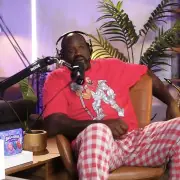
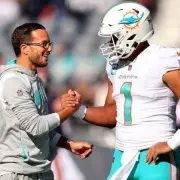
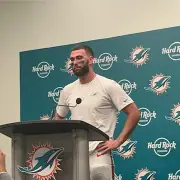
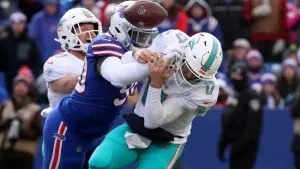
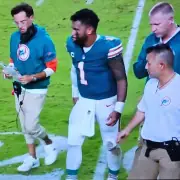

 much love broski.
much love broski.